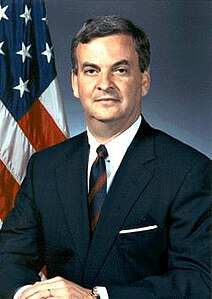Alberto Mora (lawyer): Difference between revisions
John Leach (talk | contribs) (removed from PropDel per George's request) |
Pat Palmer (talk | contribs) (adding the WPAttribution template at the bottom before changing the status of this article in Metadata) |
||
| Line 30: | Line 30: | ||
In 2006 Mora was chosen by the [[John F. Kennedy Library]] as a [[John F. Kennedy Profile in Courage Award|John F. Kennedy Profile in Courage Award Recipient]], for his efforts to prevent the use of torture.<ref name=JRKProfileInCourageAward/> | In 2006 Mora was chosen by the [[John F. Kennedy Library]] as a [[John F. Kennedy Profile in Courage Award|John F. Kennedy Profile in Courage Award Recipient]], for his efforts to prevent the use of torture.<ref name=JRKProfileInCourageAward/> | ||
== Provenance ++ | |||
{{WPAttribution}} | |||
==References== | ==References== | ||
Revision as of 08:15, 7 February 2024
| Alberto Mora | |
|---|---|
| Other names | Alberto J. Mora |

| |
| Born | 1952-04-11 Boston, Massachusetts |
| Occupation | former General Counsel of the Navy |
| Known for | took a stand opposing the use of torture at Guantanamo |
Alberto Mora was an American lawyer and public official.[1]
In early 2002 he was General Counsel of the Navy when David Brant, then the Director of the Naval Criminal Investigation Service (NCIS) informed Mora that interrogators were torturing individuals held in the newly created Guantanamo Bay detention camps.[2][3]
After consulting with colleagues David Brant, William Molzahn, Tom Kranz, Peter Murphy, Michael Gelles, Douglas Mohr, Rick Schieke, and Charlotte Wise, Mora wrote a 20 page memo to the Navy's Inspector General, explaining why the Navy should not be involved in torture.[4]
In 2006 Mora was chosen by the John F. Kennedy Library as a John F. Kennedy Profile in Courage Award Recipient, for his efforts to prevent the use of torture.[5]
== Provenance ++
- Some content on this page may previously have appeared on Wikipedia.
References
- ↑ Jane Mayer. The Memo: How an internal effort to ban the abuse and torture of detainees was thwarted., The New Yorker, 2006-02-27. Retrieved on 2024-02-04. “'Never has there been a counsel with more intellectual courage or personal integrity,' David Brant, the former head of the Naval Criminal Investigative Service, said. Brant added somewhat cryptically, 'He surprised us into doing the right thing.' Conspicuous for his silence that night was Mora’s boss, William J. Haynes II, the general counsel of the Department of Defense.”
- ↑ Alberto Mora. The First Thomas J. Romig Lecture in Principled Legal Practice, The Judge Advocate General's Legal Center and School. Retrieved on 2024-02-04. “In November of 2002, then-NCIS director David Brant took me aside after a meeting on an unrelated issue and said to me, in a low voice: 'We [meaning NCIS] are hearing rumors that detainees are being abused in Guantanamo. Do you want to hear more?'”
- ↑ David Brant. Mora Put His Career on the Line, Witness to Guantanamo, 2011-03-11. Retrieved on 2020-12-28. “Brant reported questionable interrogation techniques to Alberto Mora, then General Counsel of the Navy.”
- ↑ Alberto J. Mora (2004-07-07). Memorandum from Navy General Counsel Alberto J. Mora to Navy Inspector General. United States Navy. Archived from the original on 2014-12-30. Retrieved on 2007-05-05.
- ↑ Award Recipients: Alberto Mora, 2006. John F. Kennedy Library (2006). Retrieved on May 8, 2007. “Mora, whose civilian position accorded him a rank equal to that of a four-star general, soon came to learn that the cruel and abusive practices of United States military interrogators at Guantanamo were the result of significant policy shifts at the highest levels of the U.S. government. Over the next three years, Mora waged a campaign inside the Bush Administration to prevent military and civilian leaders from codifying any policy that might implicitly or explicitly sanction the mistreatment of Guantanamo detainees as part of the war on terror.”